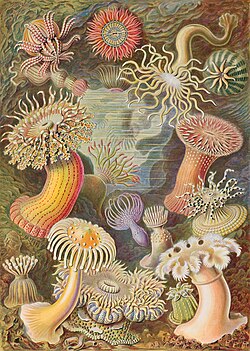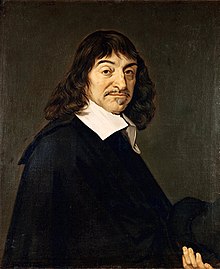Portal:History of science
The History of Science Portal
The history of science covers the development of science from ancient times to the present. It encompasses all three major branches of science: natural, social, and formal. Protoscience, early sciences, and natural philosophies such as alchemy and astrology during the Bronze Age, Iron Age, classical antiquity, and the Middle Ages declined during the early modern period after the establishment of formal disciplines of science in the Age of Enlightenment.
Science's earliest roots can be traced to Ancient Egypt and Mesopotamia around 3000 to 1200 BCE. These civilizations' contributions to mathematics, astronomy, and medicine influenced later Greek natural philosophy of classical antiquity, wherein formal attempts were made to provide explanations of events in the physical world based on natural causes. After the fall of the Western Roman Empire, knowledge of Greek conceptions of the world deteriorated in Latin-speaking Western Europe during the early centuries (400 to 1000 CE) of the Middle Ages, but continued to thrive in the Greek-speaking Byzantine Empire. Aided by translations of Greek texts, the Hellenistic worldview was preserved and absorbed into the Arabic-speaking Muslim world during the Islamic Golden Age. The recovery and assimilation of Greek works and Islamic inquiries into Western Europe from the 10th to 13th century revived the learning of natural philosophy in the West. Traditions of early science were also developed in ancient India and separately in ancient China, the Chinese model having influenced Vietnam, Korea and Japan before Western exploration. Among the Pre-Columbian peoples of Mesoamerica, the Zapotec civilization established their first known traditions of astronomy and mathematics for producing calendars, followed by other civilizations such as the Maya.
Natural philosophy was transformed during the Scientific Revolution in 16th- to 17th-century Europe, as new ideas and discoveries departed from previous Greek conceptions and traditions. The New Science that emerged was more mechanistic in its worldview, more integrated with mathematics, and more reliable and open as its knowledge was based on a newly defined scientific method. More "revolutions" in subsequent centuries soon followed. The chemical revolution of the 18th century, for instance, introduced new quantitative methods and measurements for chemistry. In the 19th century, new perspectives regarding the conservation of energy, age of Earth, and evolution came into focus. And in the 20th century, new discoveries in genetics and physics laid the foundations for new sub disciplines such as molecular biology and particle physics. Moreover, industrial and military concerns as well as the increasing complexity of new research endeavors ushered in the era of "big science," particularly after World War II. (Full article...)
Selected article -

Evolutionary thought, the recognition that species change over time and the perceived understanding of how such processes work, has roots in antiquity. With the beginnings of modern biological taxonomy in the late 17th century, two opposed ideas influenced Western biological thinking: essentialism, the belief that every species has essential characteristics that are unalterable, a concept which had developed from medieval Aristotelian metaphysics, and that fit well with natural theology; and the development of the new anti-Aristotelian approach to science. Naturalists began to focus on the variability of species; the emergence of palaeontology with the concept of extinction further undermined static views of nature. In the early 19th century prior to Darwinism, Jean-Baptiste Lamarck proposed his theory of the transmutation of species, the first fully formed theory of evolution.
In 1858 Charles Darwin and Alfred Russel Wallace published a new evolutionary theory, explained in detail in Darwin's On the Origin of Species (1859). Darwin's theory, originally called descent with modification is known contemporarily as Darwinism or Darwinian theory. Unlike Lamarck, Darwin proposed common descent and a branching tree of life, meaning that two very different species could share a common ancestor. Darwin based his theory on the idea of natural selection: it synthesized a broad range of evidence from animal husbandry, biogeography, geology, morphology, and embryology. Debate over Darwin's work led to the rapid acceptance of the general concept of evolution, but the specific mechanism he proposed, natural selection, was not widely accepted until it was revived by developments in biology that occurred during the 1920s through the 1940s. Before that time most biologists regarded other factors as responsible for evolution. Alternatives to natural selection suggested during "the eclipse of Darwinism" (c. 1880 to 1920) included inheritance of acquired characteristics (neo-Lamarckism), an innate drive for change (orthogenesis), and sudden large mutations (saltationism). Mendelian genetics, a series of 19th-century experiments with pea plant variations rediscovered in 1900, was integrated with natural selection by Ronald Fisher, J. B. S. Haldane, and Sewall Wright during the 1910s to 1930s, and resulted in the founding of the new discipline of population genetics. During the 1930s and 1940s population genetics became integrated with other biological fields, resulting in a widely applicable theory of evolution that encompassed much of biology—the modern synthesis. (Full article...)
Selected image

A lithograph from the 1904 edition of Ernst Haeckel's Kunstformen der Natur (Art Forms of Nature), depicting a variety of sea anemones.
Did you know
...that the word scientist was coined in 1833 by philosopher and historian of science William Whewell?
...that biogeography has its roots in investigations of the story of Noah's Ark?
...that the idea of the "Scientific Revolution" dates only to 1939, with the work of Alexandre Koyré?
Selected Biography -
René Descartes (/deɪˈkɑːrt/ day-KART, also UK: /ˈdeɪkɑːrt/ DAY-kart; French: [ʁəne dekaʁt] ⓘ; 31 March 1596 – 11 February 1650) was a French philosopher, scientist, and mathematician, widely considered a seminal figure in the emergence of modern philosophy and science. Mathematics was paramount to his method of inquiry, and he connected the previously separate fields of geometry and algebra into analytic geometry. Descartes spent much of his working life in the Dutch Republic, initially serving the Dutch States Army, and later becoming a central intellectual of the Dutch Golden Age. Although he served a Protestant state and was later counted as a deist by critics, Descartes was Roman Catholic.
Many elements of Descartes's philosophy have precedents in late Aristotelianism, the revived Stoicism of the 16th century, or in earlier philosophers like Augustine. In his natural philosophy, he differed from the schools on two major points. First, he rejected the splitting of corporeal substance into matter and form; second, he rejected any appeal to final ends, divine or natural, in explaining natural phenomena. In his theology, he insists on the absolute freedom of God's act of creation. Refusing to accept the authority of previous philosophers, Descartes frequently set his views apart from the philosophers who preceded him. In the opening section of the Passions of the Soul, an early modern treatise on emotions, Descartes goes so far as to assert that he will write on this topic "as if no one had written on these matters before." His best known philosophical statement is "cogito, ergo sum" ("I think, therefore I am"; French: Je pense, donc je suis), found in Discourse on the Method (1637, in French and Latin, 1644) and Principles of Philosophy (1644, in Latin, 1647 in French). The statement has either been interpreted as a logical syllogism or as an intuitive thought. (Full article...)
Selected anniversaries
- 1508 - Death of Conrad Celtes, German humanist scholar (b. 1459)
- 1774 - Death of Charles Marie de La Condamine, French mathematician and geographer (b. 1701)
- 1778 - Birth of A. P. de Candolle, Swiss botanist (d. 1841)
- 1846 - Birth of Nikolay Umov, Russian physicist (d. 1915)
- 1859 - The Codex Sinaiticus is discovered in Egypt
- 1875 - Birth of Ludwig Prandtl, German physicist (d. 1953)
- 1896 - Birth of Friedrich Hund, German physicist (d. 1997)
- 1906 - Birth of Clyde Tombaugh, American astronomer (d. 1997)
- 1928 - Death of Hendrik Lorentz, Dutch physicist, Nobel Prize Laureate (b. 1853)
- 1936 - Radium E becomes the first radioactive element to be made synthetically
- 1957 - The first nuclear-powered submarine, the USS Nautilus (SSN-571), logs 60,000 nmi (110,000 km), matching the endurance of the fictional Nautilus described in Jules Verne's 1870 novel Twenty Thousand Leagues Under the Seas.
- 1974 - Death of Satyendra Nath Bose, Indian physicist (b. 1894)
Related portals
Topics
General images
Subcategories
Things you can do
Help out by participating in the History of Science Wikiproject (which also coordinates the histories of medicine, technology and philosophy of science) or join the discussion.
Associated Wikimedia
The following Wikimedia Foundation sister projects provide more on this subject:
-
Commons
Free media repository -
Wikibooks
Free textbooks and manuals -
Wikidata
Free knowledge base -
Wikinews
Free-content news -
Wikiquote
Collection of quotations -
Wikisource
Free-content library -
Wikiversity
Free learning tools -
Wiktionary
Dictionary and thesaurus









































































